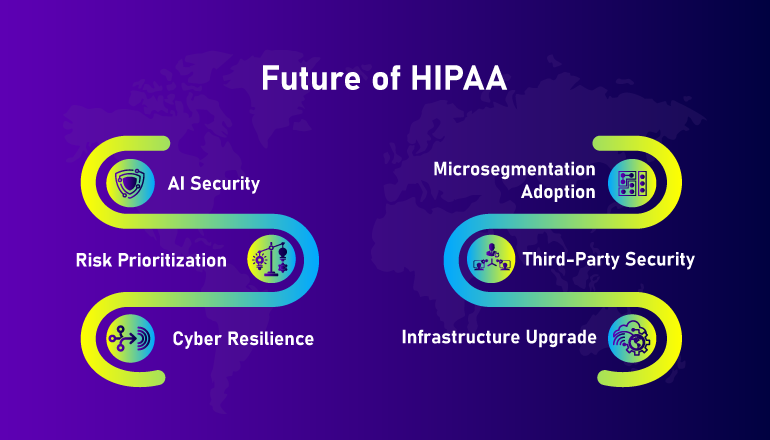The healthcare industry faces an escalating cyber crisis. Ransomware attacks are rising, with hospitals frequently experiencing breaches that disrupt patient care. Medical records have become more valuable than credit card data on the dark web, making healthcare a prime target. Outdated security frameworks no longer suffice. The 2025 HIPAA proposals are not routine updates but an urgent call for industry-wide cybersecurity reform.
From Risk Prevention to Cyber Resilience
Prevention Alone Has Failed
For decades, healthcare organizations have been obsessed with breach prevention, yet attacks continue to escalate. Many hospitals have already suffered a cyberattack, and the recovery costs exceed millions per incident. The 2025 HIPAA proposals acknowledge that breaches will happen, and organizations must focus on limiting damage and recovering fast.
- The draft rule mandates that "regulated entities must consider how their security measures support resilience in the face of an adverse event."
- Healthcare providers must implement automated breach containment and prioritize system recovery over outdated perimeter defenses.
The Impact On Healthcare Security Strategies
- AI-driven security automation will replace slow, manual response efforts.
- Cyber resilience testing will become a legal requirement.
- Zero-trust architectures will eliminate implicit access, securing internal networks.
Risk-Based Security Models Redefine Protection Standards
Generic Security Measures Leave the Most Critical Assets Exposed
Too many healthcare providers apply the same security controls to everything, wasting resources while leaving the most valuable assets vulnerable. The 2025 HIPAA proposals demand a risk-based approach, ensuring security investments prioritize the highest threats.
- The proposal states: "Entities must reduce risks to their ePHI to a level that is reasonable and appropriate for their specific circumstances."
- This means no more copy-paste compliance every hospital and clinic must conduct customized risk assessments.
The Impact On Security Investment Priorities
- Cyber risk quantification will become standard practice.
- AI-driven risk analysis will dynamically adjust security protocols.
- Hospitals will be penalized for not focusing on high-risk vulnerabilities.
The End of Legacy Medical Devices Become Security Must Come First
Hospitals Are Running on Unpatchable, Insecure Technology
Many healthcare organizations still rely on outdated medical devices that cannot be patched or secured. These devices run on obsolete operating systems, making them an easy target for cybercriminals. The new HIPAA rules will force healthcare providers to modernize, or risk penalties.
- The draft rule states: "Some regulated entities may incur costs for replacing legacy medical devices that cannot be reasonably protected against current threats."
- Ignoring these risks will no longer be an option. Hospitals must replace or secure all outdated devices.
The Impact On Healthcare Technology Infrastructure
- End-of-life devices will need immediate replacement or network isolation.
- Manufacturers will be held accountable for ongoing security updates.
- Healthcare organizations must budget for long-overdue infrastructure upgrades.
The Technical Blueprint for HIPAA Compliance in 2025
Incident Response Evolution
- Automated breach response systems will be required.
- Simulated cyberattack drills will become mandatory.
- Hospitals must report incidents faster than ever before.
Supply Chain and Third-Party Security Enforcement
- Business associates will face the same strict security requirements as covered entities.
- Zero-trust frameworks will secure vendor access.
- Healthcare organizations must audit all third-party partners for security compliance.
Cybersecurity Innovations Transform The Industry Landscape
- End-to-end encryption for all ePHI data.
- Biometric authentication AI-powered identity verification.
- Automated compliance monitoring to detect violations in real time.
- Microsegmentation to stop cyber threats from moving across networks.
Microsegmentation Redefines Network Security Architecture
.png)
Cybercriminals Exploit Within Healthcare Networks
Once a hacker breaches a healthcare system, they can move undetected across the network, accessing patient data, billing systems, and even life-saving equipment. The 2025 HIPAA rules introduce microsegmentation a game-changing security model that locks attackers out before they reach critical systems.
- Microsegmentation blocks unauthorized access to sensitive data.
- Unlike traditional perimeter security, this approach contains breaches at their source.
The Impact On Network Security And Cyber Resilience
- AI-driven micro-segmentation will be required for compliance.
- Healthcare IT teams must restructure networks to prevent cross-system infections.
- Attack surface reduction will be a core HIPAA compliance requirement.
The Future of HIPAA Security

The 2025 HIPAA proposals are not just policy updates they are a response to a cybersecurity crisis that threatens patient safety, financial stability, and trust in the healthcare industry. Organizations that fail to act will not only face compliance penalties but also real-world consequences as cyberattacks continue to escalate.
Immediate Action Steps
- Invest in AI-driven security solutions to detect and neutralize threats in real-time.
- Conduct risk-based security assessments to prioritize the most critical vulnerabilities.
- Phase out legacy devices that cannot be protected against modern threats.
- Adopt microsegmentation to limit attacker movement within networks.
- Ensure third-party vendors meet HIPAA’s new security standards.
Healthcare organizations that embrace these changes will not only comply with HIPAA but will lead the industry into a new era of cybersecurity resilience.
FAQ
Why is HIPAA being updated now?
The update is necessary due to the rise in ransomware attacks, data breaches, and outdated cybersecurity practices in the healthcare sector. The proposed rules aim to increase resilience, improve incident response, and align with modern security frameworks like NIST.
When will the new HIPAA Security Rule changes take effect?
The rule was proposed on December 27, 2024, and published in the Federal Register on January 6, 2025. After a 60-day public comment period, it is expected to take effect on March 7, 2025.


